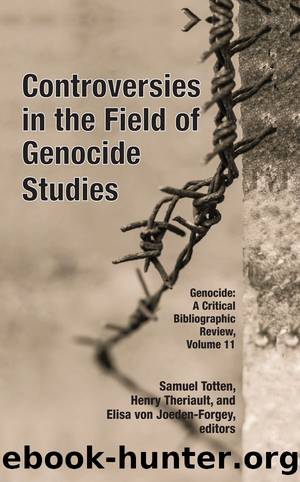Controversies in the Field of Genocide Studies by Samuel Totten

Author:Samuel Totten [Totten, Samuel]
Language: eng
Format: epub
ISBN: 9781351295000
Google: vByztAEACAAJ
Publisher: Taylor & Francis
Published: 2017-01-15T07:45:40+00:00
Annotated Bibliography
Books
Auron, Yair. The Banality of Denial: Israel and the Armenian Genocide. New Brunswick, NJ: Rutgers University Press, 2003, 338 pp.
Given the moral weight carried by the Shoah, and by extension by Israel, Auronâs book is a powerful tool in the struggle against denial of the genocides of the Armenians, Assyrians, and Hellenes. He demonstrates clearly how and why successive Israeli governments and allied interests in the United States have supported the Turkish denial campaign against US Congressional recognition. Auron and many other Jewish scholars have supported recognition efforts. His groundbreaking study covers the same four fields as this studyâpolitical, educational, media, and academicâdemonstrating how current his work remains.
Hovannisian, Richard G. Denial of the Armenian Genocide with Some Comparisons to Holocaust Denial. Sydney, Australia: Macquarie University/Centre for Comparative Genocide Studies, 1996, 60 pp.
This is the monograph of the Inaugural Armenian Genocide Commemorative Lecture, delivered on April 28, 1996. It is a particularly valuable essay because considering it in relation to the present allows one to understand what has changed over the last two decades, through explorations of categories of denial parallels between denial of the Shoah and denial of the Armenian genocide. Rather than attempting to justify his position on why Armenians suffered genocide, Hovannisian dismantles the âargumentsâ of denialists like Stanford Shaw and his protégé Justin McCarthy. Hovannisian demonstrates how denial of the genocides is controlled and decided by the Turkish state, regardless of which political party is in government, regardless of whether a civilian or military administration is in power. The monograph has a limited scope, focusing only on the United States, with passing references only to Israel. One of its other weaknesses is its lack of inclusion of denials of the genocides of the Hellenes and Assyrians.
Robertson, Geoffrey. An Inconvenient Genocide: Who Now Remembers the Armenians? North Sydney, Australia: Vintage, 2014, 304 pp.
International human-rights barrister Geoffrey Robertson makes the case for the atrocities perpetrated against the indigenous Armenian population of the Ottoman Empire to be categorized, legally, as genocide. The main strength of this book is Robertsonâs direct confrontation with the official Turkish denialist position, demonstrating that recognition is a matter of law, not history alone. Drawing on his legal experience, Robertson systematically presents the evidence for the Armenian case constituting genocide, then applies the evidence to the law of genocide. He concludes that âthose political leaders who gave the orders intended that a substantial part of the Armenian population would be exterminated in consequence. There is no other inference that is âreasonableââ (Jennifer Balint, 2015, âBook review: Armenian atrocities deemed âAn Inconvenient Genocideâ that no one acknowledges,â Sydney Morning Herald, January 31, http://www.smh.com.au/entertainment/books/book-review-armenian-atrocities-deemed-an-inconvenient-genocide-that-noone-acknowledges-20150128-12zxh1.html#ixzz40hlyZ6Z1 [accessed February 18, 2016]). His own Freedom of Information requests illustrate clearly how British governments are consistently advised to not recognize the genocide (8â9) that in 1918 then-Secretary of the Admiralty, Winston Churchill, declared to be â[a]n administrative holocaust ⦠there is no reasonable doubt that this crime was planned and executed for political reasonsâ (22). The Australian-born jurist proceeds to address the
Download
This site does not store any files on its server. We only index and link to content provided by other sites. Please contact the content providers to delete copyright contents if any and email us, we'll remove relevant links or contents immediately.
Cecilia; Or, Memoirs of an Heiress — Volume 1 by Fanny Burney(32561)
The Great Music City by Andrea Baker(32021)
Cecilia; Or, Memoirs of an Heiress — Volume 2 by Fanny Burney(31958)
Cecilia; Or, Memoirs of an Heiress — Volume 3 by Fanny Burney(31944)
We're Going to Need More Wine by Gabrielle Union(19050)
All the Missing Girls by Megan Miranda(16038)
Pimp by Iceberg Slim(14515)
For the Love of Europe by Rick Steves(14149)
Bombshells: Glamour Girls of a Lifetime by Sullivan Steve(14078)
Talking to Strangers by Malcolm Gladwell(13375)
Norse Mythology by Gaiman Neil(13372)
Fifty Shades Freed by E L James(13245)
Mindhunter: Inside the FBI's Elite Serial Crime Unit by John E. Douglas & Mark Olshaker(9346)
Crazy Rich Asians by Kevin Kwan(9295)
The Lost Art of Listening by Michael P. Nichols(7507)
Enlightenment Now: The Case for Reason, Science, Humanism, and Progress by Steven Pinker(7315)
The Four Agreements by Don Miguel Ruiz(6767)
Bad Blood by John Carreyrou(6625)
Weapons of Math Destruction by Cathy O'Neil(6283)
